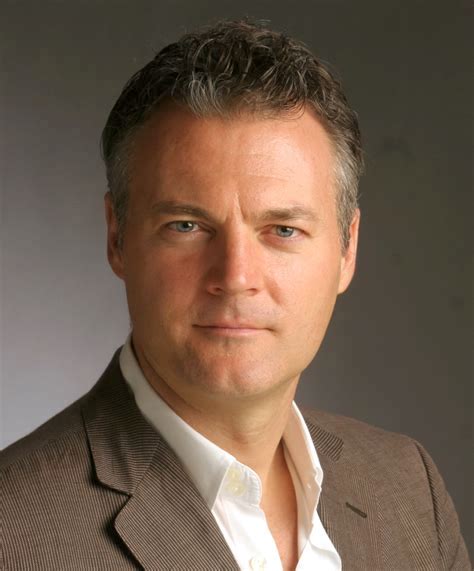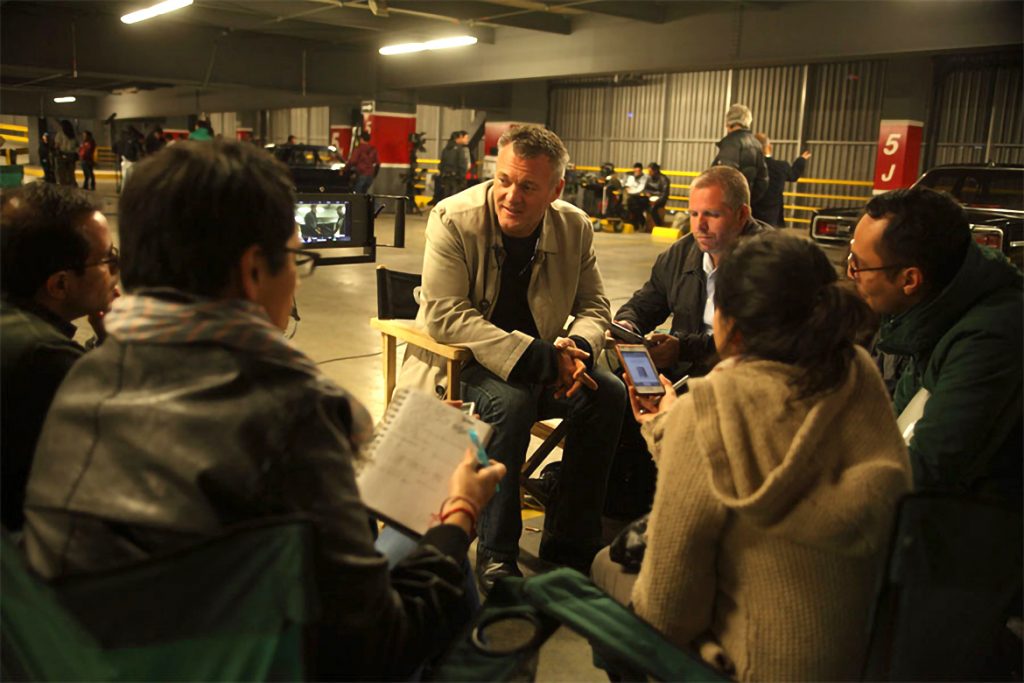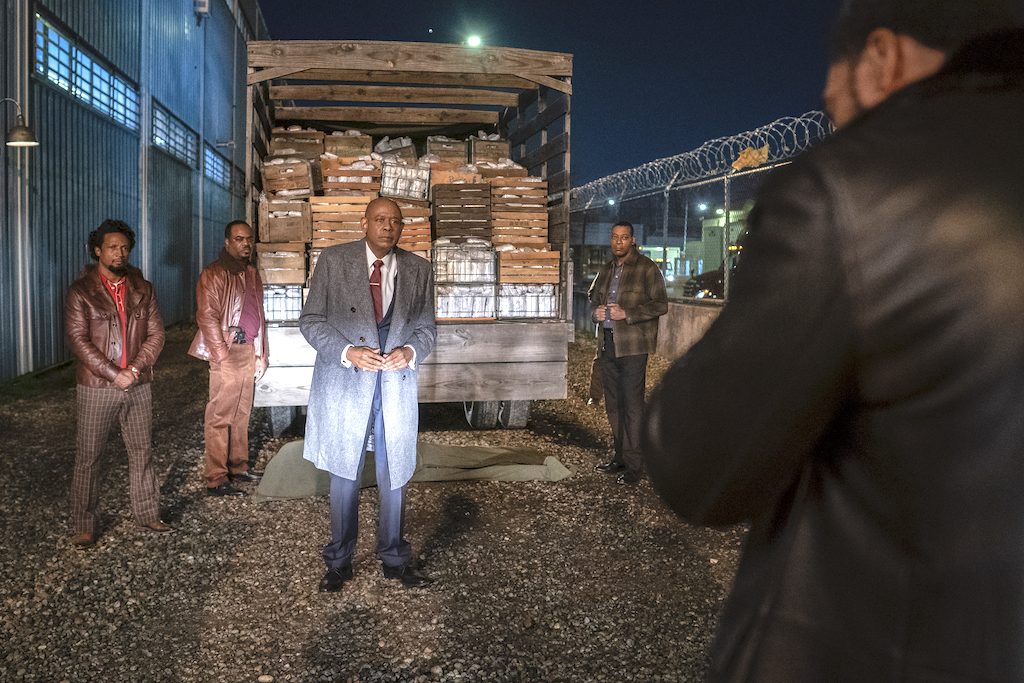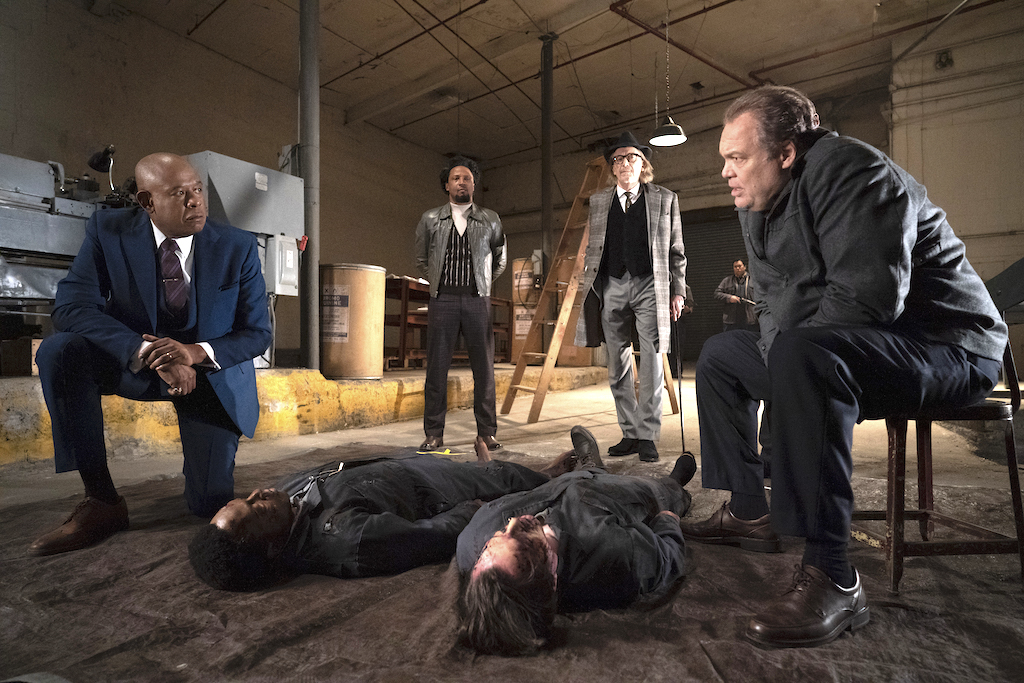After college, Chris Brancato realized he had “no marketable skills whatsoever.” He joked that his “lack of options” led him down the path of becoming a screenwriter. Beyond this initial assessment, his mother was also a novelist, so he saw someone getting paid to write and saw it as a career possibility.
“That helped demystify the process,” he said. The next step in uncovering the path to Hollywood came from a friend who landed a job on The Equalizer. “He showed me the script and I thought, ‘I just figured out what I want to do.’”
Brancato first landed writing jobs on Beverly Hills, 90120 and The X-Files. These days, he’s best known for his work on Hannibal, Narcos, Narcos: Mexico, and Godfather of Harlem (but he’s also listed as a writer of the upcoming Sherlock Holmes 3 screenplay).
“In some ways, the mercenary outlook to make a living was helpful. The desire for artistry and excellence of craft came a little bit later. I certainly made a lot of mistakes in the beginning.”
Life Experience
“Going to film school in those days seemed like less of a necessity,” said Brancato. “I was one of the few people I knew at the time who wanted to try to write for film and television. It was much more of a mystical career.”
At the time, it was harder to find screenplays to read, outside of LA-based libraries. The news, such as who had written what, was also less prevalent than today. But, when Jim Cash and Jack Epps Jr. wrote Top Gun for Tony Scott, it was a big deal.

Chris Brancato
“These two guys, Cash and Ebbs, were the highest paid screenwriters in Hollywood even though they hadn’t yet had any movies made. This was right in advance of Top Gun. That seemed strange to me that you could get so well paid not having anything made.”
The mysteries around the craft made most people feel breaking in was nearly impossible. “Ultimately, that’s what led me to move from New York to Los Angeles. I did come to believe William Goldman’s statement that you should be in Los Angeles, at least for the beginning of your career. I’m not sure if that’s valid today, but it was then.”
Other natural changes in the industry come in the form of the type of television being made. “It’s been a hugely and beneficial shift. In the early 90s you had four broadcast networks and the main preponderance were big tent shows or silly shows. You didn’t have the latitude to do what we do now in terms of storytelling.”
Latitude Storytelling
“I cut my teeth writing network shows. Some decent. Some truly horrible. But all of sudden, we could do shows that are darker, had a little more edge, and were less concerned with nailing 22 episodes per year. True excellence is the watch word.”
The screenwriter said movies are harder to sell now because television characters are more interesting. “We have a feature influence because a lot of feature writers have migrated to television because of the subject matter.”
As for the mindset between film and television, Brancato describes them as different rules. “After writing a feature where you’re alone, the idea of being in a writing room and discussing things was definitely something positive. At the same time, sometimes the writer’s room won’t get you as far as you think. I’ve been in rooms where we don’t get as much done as if you were just sitting at home doing it yourself. It’s a mixed bag, but there’s nothing better than being with people set to do great creative work and that synergy between people.”
At the time of this interview, Brancato said he’s working on a feature where he’s struggling to write a page per day, where “by necessity” the writing is faster. “For writers, you have to be aware that writing a novel is one thing with a certain set of rules and techniques. Features are another. Television is another.”
Writing Narcos
In the first season of Narcos, the screenwriter said most of his big picture ideas were television concepts (as opposed to extended movie ideas). “The Director José Padilha said to me, ‘We’re making a ten hour movie. I said, ‘Well, we’re not because nobody would want to see a ten hour movie.’ It’s ten, discreet hours of television that hopefully add up to something larger than the individual parts.”

Chris Brancato on the set Narcos
Specifically, he looked for something he calls “the candy-colored logline.” He added, “It’s something you can say about the show in one sentence that makes it feel as though it just pops.” For Narcos, this is about Escobar’s origin story in the pilot. The second episode is about the Medellín Cartel. The third is about Escobar running for Congress. “I had tentpole ideas behind the episodes and that forms a spine, then you can hang all sorts of ornamentation off the tree.”
In this way, the writers had freedom to discuss multiple themes, but within the hour, there’s an inciting incident, rising action, a vaulting climax and resolution. “I do think that’s necessary to make television work, but those same principles are required in a two-hour movie. You just have a longer period of development in the dreaded second act.”
Plotting Godfather of Harlem
In the Forest Whitaker-led series, Godfather of Harlem, the story follows a Harlem gangster named Bumpy Johnson. Essentially, the story is meant to be a prequel to the 2007 film American Gangster, starring Denzel Washington as Frank Lucas.
“The first year, we set up Forest Whitaker as someone coming out of Alcatraz and coming back to a Harlem he barely recognizes because the Italians have taken over. We get to know characters professionally and personally. I wanted to bring Bumpy through the episodes having effectively claimed at least a part of Harlem.”

Ellsworth ‘Bumpy’ Johnson (Forest Whitaker). Photo by Myles Aronowitz/Epix
While the writers were creating storylines for Season 2, George Floyd was murdered. “All of a sudden, while the show dealt with racism and contemporary issues through the prism of the past, the second season became all the more of a privilege and responsibility to tackle police brutality, voter suppression, white supremacy, and black supremacy too. We use the show to touch on everything. Some things have changed a lot. Some things haven’t changed at all,” he said about the historical fiction series.
Within all of these responsibilities, the writers were also worried they could get repetitive with the Blacks versus Italians storylines. “So we added this third rail, which was The French Connection.” Beyond the Gene Hackman movie, the creators were also thinking about the real life storylines involving the true story of a French heroin smuggler.
“I thought we could make a seasonal arc with Bumpy trying to control the French Connection in a means of taking back Harlem. Then, we thought about what else we might want to happen because we want to avoid repetition and surprise viewers.” Some storylines, such as those involving Malcolm X (Nigel Thatch) or Cassius Clay (Deric Augustine) in more detail were pushed to notes for a possible third season.
“Godfather of Harlem is historical fiction, so we do have the latitude to mess around a little bit with timelines.” Beyond the upcoming second season, the writers also have plans for a possibility of six seasons as being “the education of Bumpy Johnson” which would complete the arc of the character in an incremental way.
Developing a Game Plan
In terms of big picture game plans, Chris Brancato believes writers should be able to express their ideas for concepts in simple terms. “If you’re developing a season of television, you want to be able to describe the main thrust of the show and the movement of your characters through the season – and you have to do it conversationally.”
For the first season of this series, Bumpy is meant to have some wins and losses, as he tries to take back Harlem, and eventually befriends Malcolm X, who helps him grow more as a character. “What we’ve also observed is the strange collision between organized crime and the Civil Rights movement. That’s what we thought made the series feel different,” he said about his initial idea he pitched with Paul Eckstein.
“We saw a unique angle on the show to put two things together you just hadn’t seen before. It turned out we were right, because no executive had heard a show about the collision of the Civil Rights movement and 1960s Harlem. I would say to the writers out there, it looks like there are a million platforms and a million shows, but it’s so hard to get a show on the air.”
Since no one gets fired for saying “No,” that’s commonplace in the industry. At the same time, Brancato said there’s an ironic twist in pitch meetings that somehow the zeitgeist brings similar ideas to executives. “The ideas come in droves, so one year everybody is pitching Warlock shows. They’ve heard every idea, every version of it, so why should they do it all? And why should they do it unless you’ve got something to say or have some angle on it they’ve never heard in 20-30 years.”
Feeling familiar and different, like Harlem of Godfather and Narcos, appears to be the sweet spot. “Nothing new there,” he said, “but if you dress it up and turn it on its ear, you can get lucky. Assume that no matter how cool the idea seems to you, they’ve heard it, some version of it.”
How to Pitch Better
In terms of pitching advice, Chris Brancato said he never goes in with a pitch longer than seven pages. “Anything longer takes you over 18 minutes and it starts to get boring. Say in 18 minutes or less, but don’t make it too short.”
“You don’t have to be off-book, but I take that pitch, highlight key phrases, practice a bunch with my assistant or say it out loud so I’m conformable. Then, and a pitch is this, nobody wants to hear a laundry list of characters. They want to meet characters in action.”
Like a script, the scenes introduce characters. “I introduce characters by pitching scenes. Those scenes might not exist in the pilot. They might not exist in the show, but don’t just tell stats. Also, in the first 2-3 minutes, executives are either leaning forward or meaning back. You want to have them leaning forward. So the first minute or two, I try to make it a cinematic experience.”
The screenwriter then gave a specific example similar to Homeland with a sci-fi twist, “John Henderson works for a military defense contractor in DC. He’s got a wife and two lovely kids. The weird thing is this: somebody is stealing an hour a day from him. For reasons we don’t know, he’s cognizant 23 hours a day, but the 24th hour is gone from his memory. He thinks he’s doing regular stuff, but he’s not. The series is about him trying to find out who is doing that and why. What we come to find out is that John Henderson is chasing the most dangerous terrorist in the world, himself.”
Beyond the idea itself, the screenwriter said you need to create a “tsunami.” He concluded, “It is the idea, but it’s not just the idea. It’s the showrunner, the production company involved, your track record, how many hits you’ve had, etc. and you have to create a tsunami, so the executives feel like, ‘Chris is going to walk out of this room and he’s leaving Amazon to head over to Apple and he’s dropping that same killer pitch on them and they’re going to buy it.’”
He concluded, “Now that rarely happens, but that’s what you’re going for. For Godfather, I wrote the script and had Forest in the room and even then I knew that was no guarantee. He’s a phenomenal actor but it’s a cut-throat world and that barely got us over the finish line. We only sold the show to one company, Epix. That was my attempt to create a tsunami.”
This interview has been condensed. Listen to the full audio version here.

